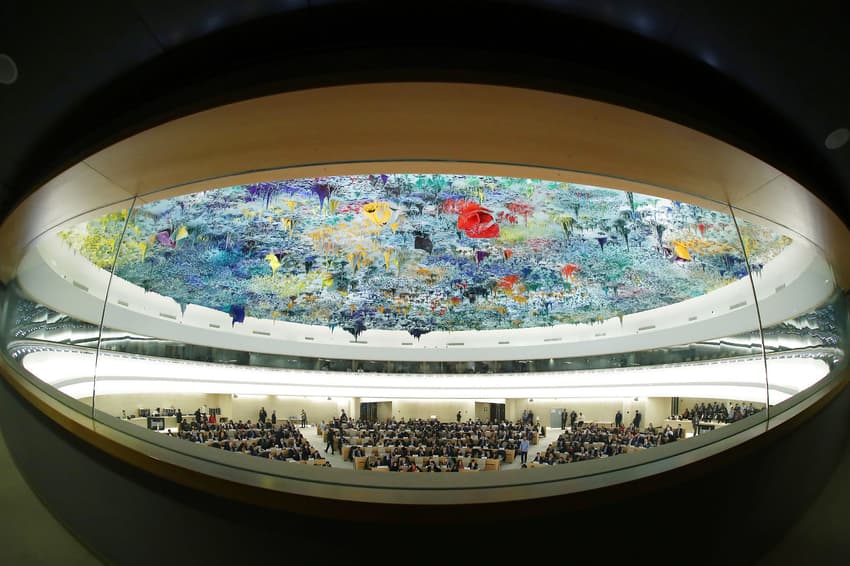Denmark 'expressed concern' over rights abuses before agreeing Rwanda asylum deal

Denmark expressed concern over human rights abuses in Rwanda at a UN meeting in early 2021, months before agreeing a partnership with the African country on asylum issues.
During a virtual UN meeting hosted in Geneva in January 2021, Denmark expressed official concern over whether Rwanda had breached basic human rights, newspaper Jyllands-Posten reports.
The meeting was a few months before Danish ministers met Rwandan counterparts to begin discussions over placing an offshore Danish asylum centre in the African country.
READ ALSO:
- Danish government tables bill for offshore asylum centres as ministers return from Rwanda
- Danish ministers visit Rwanda but stay quiet on agreement
- Amnesty slams Rwanda migrant deal as ‘new low’ for Denmark
Denmark’s ambassador in Geneva Morten Jespersen submitted the Danish concerns at a UN Universal Periodic Review on January 25th last year according to Jyllands-Posten, which has reviewed video material provided by the UN.
The annual UN reviews are held with purposes of monitoring compliance with human rights conventions.
“We remain concerned over accusations of arbitrary arrests and torture and mistreatment in detention centres and military facilities,” Jespersen said at the meeting.
Denmark’s plans to work with Rwanda on asylum were not officially known at the time of the meeting.
Two Danish ministers travelled to Rwanda three months after the UN meeting for the first talks over a potential asylum centre in Rwanda where Denmark would place refugees offshore while processing their cases.
A non-binding agreement between the two countries was subsequently signed but a concrete proposal for the centre has yet to be presented.
The expression of concern table by Denmark at the meeting was based on a report by the UN’s Office of the High Commissioner for Human Rights (OHCHR), the Danish foreign ministry told Jyllands-Posten.
The OHCHR report accused Rwanda of unofficial imprisonments and for torturing prisoners to extract confessions in “prison-like facilities”.
Rwanda has denied the accusations.
A spokesperson from the UN’s refugee agency UNHCR said last month that the agency “does not view the idea of outsourcing asylum, whether to Rwanda or another country, as a responsible or sustainable solution.”
In comments to Jyllands-Posten, Minister for Immigration and Integration Kaare Dybvad Bek insisted that an offshore asylum centre in Rwanda would improve the existing asylum system in Denmark, which he said was “full of human tragedies”.
A deal with Rwanda would be on condition of compliance with international obligations, he added.
Comments
See Also
During a virtual UN meeting hosted in Geneva in January 2021, Denmark expressed official concern over whether Rwanda had breached basic human rights, newspaper Jyllands-Posten reports.
The meeting was a few months before Danish ministers met Rwandan counterparts to begin discussions over placing an offshore Danish asylum centre in the African country.
READ ALSO:
- Danish government tables bill for offshore asylum centres as ministers return from Rwanda
- Danish ministers visit Rwanda but stay quiet on agreement
- Amnesty slams Rwanda migrant deal as ‘new low’ for Denmark
Denmark’s ambassador in Geneva Morten Jespersen submitted the Danish concerns at a UN Universal Periodic Review on January 25th last year according to Jyllands-Posten, which has reviewed video material provided by the UN.
The annual UN reviews are held with purposes of monitoring compliance with human rights conventions.
“We remain concerned over accusations of arbitrary arrests and torture and mistreatment in detention centres and military facilities,” Jespersen said at the meeting.
Denmark’s plans to work with Rwanda on asylum were not officially known at the time of the meeting.
Two Danish ministers travelled to Rwanda three months after the UN meeting for the first talks over a potential asylum centre in Rwanda where Denmark would place refugees offshore while processing their cases.
A non-binding agreement between the two countries was subsequently signed but a concrete proposal for the centre has yet to be presented.
The expression of concern table by Denmark at the meeting was based on a report by the UN’s Office of the High Commissioner for Human Rights (OHCHR), the Danish foreign ministry told Jyllands-Posten.
The OHCHR report accused Rwanda of unofficial imprisonments and for torturing prisoners to extract confessions in “prison-like facilities”.
Rwanda has denied the accusations.
A spokesperson from the UN’s refugee agency UNHCR said last month that the agency “does not view the idea of outsourcing asylum, whether to Rwanda or another country, as a responsible or sustainable solution.”
In comments to Jyllands-Posten, Minister for Immigration and Integration Kaare Dybvad Bek insisted that an offshore asylum centre in Rwanda would improve the existing asylum system in Denmark, which he said was “full of human tragedies”.
A deal with Rwanda would be on condition of compliance with international obligations, he added.
Join the conversation in our comments section below. Share your own views and experience and if you have a question or suggestion for our journalists then email us at [email protected].
Please keep comments civil, constructive and on topic – and make sure to read our terms of use before getting involved.
Please log in here to leave a comment.